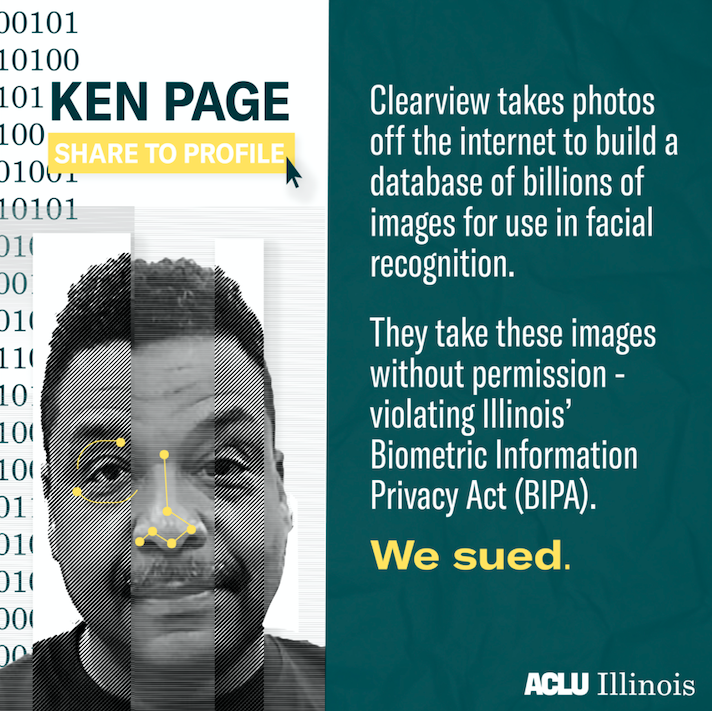The American Civil Liberties Union and the ACLU of Illinois took Clearview AI to court today to bring an end to the company’s unlawful, privacy-destroying surveillance activities. The lawsuit is the first to force any face recognition surveillance company to answer directly to groups representing survivors of domestic violence and sexual assault, undocumented immigrants, and other vulnerable communities uniquely harmed by face recognition surveillance. You can read the complaint in full here.
The lawsuit was filed in Illinois state court on behalf of the ACLU, the ACLU of Illinois, the Chicago Alliance Against Sexual Exploitation, the Sex Workers Outreach Project, the Illinois State Public Interest Research Group, and Mujeres Latinas en Acción. The groups argue that Clearview AI violated — and continues to violate — the privacy rights of Illinois residents under Illinois Biometric Information Privacy Act (BIPA).
“Clearview has violated the rights of all Illinoisans, but the harms from this technology are not shared equally across our state,” said Linda Xóchitl Tortolero, President and CEO of Mujeres Latinas en Acción, a non-profit organization dedicated to empowering Latinas, including by providing services to survivors of domestic violence and sexual assault, and undocumented immigrants. “For many Latinas and survivors, this technology isn’t just unnerving, it’s dangerous, even life-threatening. It gives free rein to stalkers and abusive ex-partners, predatory companies, and ICE agents to track and target us. This company has no business exploiting Illinoisans’ sensitive biometric information without our knowledge and consent.”
Using face recognition technology, Clearview has captured more than three billion faceprints from images available online, all without the knowledge — much less the consent — of those pictured. Reports suggest that neither the United States Government nor any American company has ever compiled such a massive trove of biometrics. Clearview claims that, through this enormous database, it can instantaneously identify the subject of a photograph with unprecedented accuracy, enabling covert and remote surveillance of Americans on a massive scale.
“Companies like Clearview will end privacy as we know it, and must be stopped,” said Nathan Freed Wessler, senior staff attorney with the ACLU’s Speech, Privacy, and Technology Project. “This menacing technology gives governments, companies, and individuals the unprecedented power to spy on us wherever we go — tracking our faces at protests, AA meetings, political rallies, places of worship, and more. The ACLU is taking its fight to defend privacy rights against the growing threat of this unregulated surveillance technology to the courts, even as we double down on our work in legislatures and city councils nationwide.”
This destruction of our fundamental right to privacy frightens me so much that it was one of the plot lines in my most recent novel, Dead Land,” said Sara Paretsky, an author and ACLU member from Chicago whose concern is highlighted in the complaint. “My fictional detective can come up with strategies to protect herself, but in real life it’s close to impossible. If we can draw a line around ourselves – our bodies, our minds, our lives – that neither government nor private companies can cross, then this lawsuit will be one of the most important protections Americans can have in the high-tech era.”
BIPA requires companies that collect, capture, or obtain an Illinois resident’s biometric identifier — such as a fingerprint, faceprint, or iris scan — to first notify that individual and obtain their written consent. This is because the involuntary capture of biometric identifiers — which cannot be changed — poses greater risks to an individual’s security, privacy, and safety than the capture of other identifiers, such as names and addresses.
“We can change our names and addresses to shield our whereabouts and identities from stalkers and abusive partners, but we can’t change our faces,” said Mallory Littlejohn from the Chicago Alliance Against Sexual Exploitation, a Chicago-based non-profit organization dedicated to protecting and advancing the rights of survivors of sexual violence and exploitation. “Clearview’s practices put survivors in constant fear of being tracked by those who seek to harm them, and are a threat to our security, safety, and well-being.”
Clearview gained national attention after the New York Times revealed the company was secretly capturing untold numbers of biometric identifiers for purposes of surveillance and tracking without notice to the individuals affected. The company’s actions embodied the nightmare scenario privacy advocates long warned of, and accomplished what many companies — such as Google — refused to try due to ethical concerns. In subsequent press interviews, Clearview’s CEO repeatedly claimed the company’s database is “strictly for law enforcement,” only later to have internal company documents reveal a client list of public and private entities. Following the NYT story, the New Jersey attorney general prohibited state law enforcement from using Clearview’s system, the Vermont attorney general sued, and members of Congress demanded answers.
“As members of a criminalized population and profession who additionally battle social stigma and economic marginalization, sex workers’ ability to maintain anonymity is crucial to personal safety both on and off the job,” said Kathryn Rosenfeld, a member of the Sex Workers Outreach Project-Chicago Leadership Board. “Sex workers are already extremely vulnerable to violence and persecution by law enforcement, clientele, would-be economic exploiters, and members of the general public. The ability of these individuals to track and target us using facial recognition technology further threatens our community’s ability to earn our livelihoods safely.”
The ACLU is leading a nationwide movement to ensure individuals — not private entities or government agencies — get to decide if and how surveillance technologies are used in their communities. Already, as part of ACLU-led campaigns, multiple towns and cities, including San Francisco, Berkeley, and Oakland, CA, and Springfield and Cambridge, MA, have adopted model ACLU legislation banning the government’s use of face recognition. Following another ACLU effort, the state of California blocked use of the technology on police body cams. Outraged by an ACLU investigation revealing Amazon was selling error-prone and biased face surveillance technology to law enforcement, shareholders and employees have urged the company cease its practices and members of Congress have opened investigations.
The ACLU of Illinois was the driving force in enacting the BIPA a dozen years ago, and it, along with PIRG and others, have successfully defended against corporate efforts to weaken the law in recent years.
“Clearview is violating the privacy rights of Illinois residents at a staggering scale,” said Rebecca Glenberg, senior staff counsel with the ACLU of Illinois. “Clearview’s practices are exactly the kind of threat to privacy that the Illinois legislature intended to address through BIPA, and demonstrate why states across the country should adopt legal protections like the ones in Illinois.”
The ACLU teamed up with the firm law firm Edelson PC to bring this case. Edelson is a nationally recognized leader in consumer privacy litigation and filed the first cases under BIPA, have fought back attempts to gut the law in and out of the courtroom, and recently secured a record-breaking $550 million settlement with Facebook over a class-action lawsuit alleging the tech giant’s use of face recognition technology violated BIPA.
“Clearview’s actions represent one of the largest threats to personal privacy by a private company our country has faced. If a well-funded, politically connected company can simply amass information to track all of us, we are living in a different America” said Jay Edelson of Edelson PC, who is lead counsel in the matter handling this case on a pro bono basis. “Our firm is extremely focused on this battle.”
"For far too long tech companies have misused our most sensitive data while facing too little consequence," said Abraham Scarr, Director at the Illinois Public Interest Research Group. "The BIPA is unique in that it allows Illinois residents to control not only their biometric information, but also the laws governing its use, putting the power back into the hands of the people."

